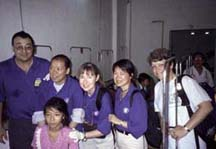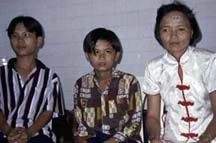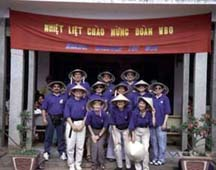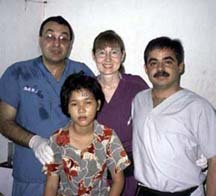Being raised Catholic, I always thought of the word mission in relation to an attempt to propagate a religious faith. A recent experience has shown me that the term may have a much different connotation. In checking Webster's dictionary I see that one definition of mission is "a body of persons sent to perform a service or carry on an activity". I recently had the opportunity to participate in a vision mission in Vietnam.
The World Blindness Outreach organized the mission. Albert Alley, M.D. and Bill Ebinger, D.V.M. founded the WBO in 1989. Each year the WBO conducts three to four vision missions to underdeveloped countries. The WBO has the following goals: to perform as many ophthalmic surgeries as possible on indigent patients, to train local medical personnel in the latest techniques so they can provide ongoing care, to leave behind supplies and materials for the local community's use, and to serve as ambassadors of understanding and goodwill among peoples.
 The Vietnam Vision Mission ran from June 4-June 14, 1999. There were twelve people on our team. The three ophthalmologists were Albert Alley, M.D. from Lebanon, PA (the team leader), Eduardo Romo, M.D. from Mexico (an excellent surgeon with a great sense of humor) and myself, Sue Carlson, M.D. from Arlington, VA (the first female ophthalmologist to attend a WBO mission). The operating room assistant/surgical nurses were Bill Ebinger, D.V.M. from Leonard, MI (a vet who specializes in ophthalmology), Jean DeChristopher from Catasauqua, PA (a nurse whose hobby is skydiving) and Christine Landis from Allentown, PA (a nurse who enjoys hiking and climbing). Rita Hendrickson from Springfield, VA was our ophthalmic technician. She measured the eyes of each cataract patient so that the power for the intraocular lens could be calculated. Our instrument technician was Diane Ebinger from Leonard, MI. Diane sterilized the instruments between each surgical case. Than Mai, a Vietnamese Buddhist nun was the project coordinator. She arranged our invitation from the Hua Nghia Hospital, and coordinated our meals, lodging, and transportation. Namhee Won, a Vietnamese American from Carmel, CA was our interpreter. Yvonne Nelson from Hershey, PA was our assistant. Richard Brown from York, PA was the mission coordinator. Dick is the District Governor of the York Rotary Club, which sponsored the mission.
 We did surgery for 41/2 days during our stay in Vietnam. We performed 132 ocular surgeries: 120 cataract extractions and 12 strabismus surgeries. In order to receive the surgery the patients had been screened 3 times prior to our arrival. There were so many patients with such advanced cataracts that any patient who had better than "count fingers" vision was excluded from surgical consideration. In determining which of the patients with strabismus should receive surgery, we chose the youngest patients with the most severely affected ocular muscle imbalance. With these patient selection criteria we strove to provide the greatest good possible within our time constraints.
The operating conditions were less than ideal. It was not unusual for the Vietnamese nurse to be swatting at bugs during the surgeries, and there was an incident where a praying mantis jumped on the scrub nurse's head and then onto our instrument table during a surgery. When the daily storm passed through, an electrical outage was expected. Several surgeries were completed by flashlight. Due to physical set-up of the rooms, each operating room was a thoroughfare for post-op patients was being escorted through my OR room, his pants fell down and he shuffled, "butt naked" through the room. As most of the supplies, intraocular lenses, and suture material were donated, each surgeon had to be flexible and do his best within the constraints of what was available.
 The post-operative situation was also remarkable. As each patient needed to be evaluated on the day after his surgery and as many patients traveled from great distances, most patients spent their post-op night in the hospital. The hospital rooms were large dorm-type rooms with up to 40 single cots per room. Both male and female patients stayed in the same room and it was not unusual for three patients to share a cot. The hospital did not provide food for the patients so family members would crowd into the dorm rooms with home cooked foods to feed their loved ones.
When performing surgeries on so many patients in such a short time, it is impossible to individualize each patient. But there are several patients who stand out in my mind. There was an old woman that had light perception vision in each eye. She had to be led into the operating room. When her eye patch was removed the next day she burst into tears and smiles exclaimed, "I can see!" There was a Buddhist nun who kept bowing and offering us blessings after her cataract surgery. We had the opportunity to visit her monastery on our one sightseeing day prior to departure. She ran up to me and gave me a big hug. There was a little girl with crossed eyes who sang a song for us while she was waiting for her surgery. There was a 14-year old boy with strabismus who cried when describing how much he wanted surgery. After surgery he cried tears of joy and said, "Forget me not." On the day we were examining the children who underwent strabismus surgery, I looked around. The children, their parents, the nurses, and the doctors all had tears in their eyes. I had not been prepared for the strong emotions that were generated during our mission.
 There are several quotes that exemplify our trip. On our first 40 minute van trip from our hotel to the hospital we drank in the sights of rice paddies, water buffaloes, coolie hats, single room thatched roof huts, hundreds of bicycles and motorcycles, often transporting up to 5 people each. While viewing this panorama, I quoted Dorothy from the Wizard of OZ, "I don't think we're in Kansas anymore."
The Vietnamese language is very nasal and it was difficult for us to speak more than a few words. We all became proficient with one phrase. "Thank you" is translated as "cam on". These words are pronounced "come on" and this quickly became our favorite Vietnamese saying.
In his farewell speech to the hospital administrator, doctors, and staff, Dr. Alley said, "We came as strangers but we are leaving as friends." Knowing that the hospital administrator had been in the Viet Cong army and would have been considered and enemy just 25 short years ago, knowing that several of our patients had surgery as the result of trauma suffered during the Vietnamese War, knowing that several of our patients had fought against us in the war, Dr. Alley's statement was particularly poignant.
Our trip back to the United States took about 36 hours. We were so delighted with the anticipation of seeing our families, taking a warm shower, sleeping in our own beds, and being able to drink the water and eat "normal" food again. When coming through customs in Newark, NJ the sign welcoming us to the United States prompted another quote from the Wizard of OZ: "There's no place like home."
In summary, it was a privilege to be able to participate in the WBO's Vietnam Vision Mission. The experience has enriched my life in many ways. To the people of Vietnam: the Hau Nghia Hospital administrator, doctors, staff, patients and their families, and to the members of the World Blindness Outreach team I would like to say, "Come on" and "I'll forget you not."
Sue Carlson, M.D.
June 15, 1999 |
